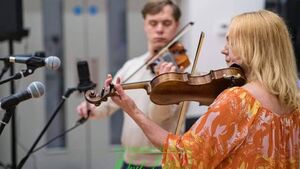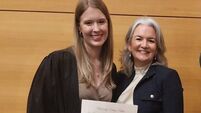'It is very painful to realise that there is no justice in this world'

Olena Nimchuk playing music with her son Anatoliy.
The recent intervention by US President Donald Trump in Ukraine’s fight against invading Russian armies may have made Mayo-based Ukrainians less willing to return to their homeland, with some telling the that Trump’s recent overture to Russia has made them more worried that a durable peace can be achieved. Given this situation, some see their long-term future in Mayo.
One Ballyhaunis-based refugee believes Trump’s decision to re-engage with the Kremlin has emboldened Russia.
“After Trump came to power, things got much worse. Russia has realised that it can do whatever it wants,” said Yulia Babak.
She explained how on a night last month, just after the American-Russia summit in Riyadh, 267 [Iranian-made] Shahed rockets were fired into Ukraine, “a number not seen since the start of the war”.
"Listening to the results of the negotiations after the meeting in Saudi Arabia, to which Ukraine was not invited, it is impossible to understand whether these are political decisions or the ravings of mentally ill people.”
Against this backdrop, Babak, from Kremenchuk, finds the question of whether to return to Ukraine a “painful” one.
“I was left alone with my two sons, my husband stayed in Ukraine, as according to our legislation he cannot leave the country. The eldest son has not seen his father for two years. For me, the most important thing is not where my family is, but that the family is together. I am very afraid for the future of my sons, so everything will depend on how the war ends.”
Another refugee, Olena Nimchuk, stresses her gratitude to Ireland for its shelter but she dreams of returning to Ukraine where her husband and mother remain.
“But against the background of today's events and Trump's statements, I am very scared and I do not understand what will happen next with my country and how we should proceed. It is very sad and painful to realise that there is no justice in the world, that evil remains unpunished. The world has proven this. Money is the main thing, and people's lives are worth nothing.”
Babak believes freezing the war - as happened after Russia took Crimea in 2014 - will not end the war.
“Many of my close friends have died defending their land, so I don't think after what I've heard that Trump will end the war rather than freeze the conflict. Giving him territories with rich deposits reminds me of science fiction films where aliens come to other planets and suck out the useful resources. We paid a very expensive price for our freedom, so peace is the return of Ukraine's borders to 2014 and the country's admission to NATO and the EU. I do not want to be afraid for the future of my children.”
As Ukraine faces the prospect of an imposed peace, those whose former homes are in Russian-occupied territory see their future in Ireland.
“I really want to believe that the war in Ukraine will end and people will be able to live peacefully and enjoy life, but my life experience says otherwise,” explained Natalya Litovchenko who left her hometown in 2014 when Russian troops first appeared in eastern Ukraine as “little green men” invading parts of eastern Ukraine and Crimea.
“In 2022, everything happened again,” recalled Ms Litovchenko. “I do not consider Ukraine safe even if a peace treaty is signed. When you are responsible for the safety and life of your child, it is very important to understand.”
Returning to Ukraine is currently not an option given Natalya’s house is in occupied territory. An apartment she rents in Kharkiv is 25 kilometres from the Russian border.
Facing such uncertainty, she wants to stay and live in Ireland “if my daughter and I have such an opportunity”.
A business student at the Castlebar campus of the Atlantic Technology University and a talented dressmaker, Litovchenko says she likes her life in Ireland.
“I am very grateful to all the people who helped me and my daughter adapt to a new place. I have friends, the opportunity to work and study, and security.”
Also a student at the ATU in Castlebar and working part-time, Yulia Babak finds Ireland a “very hospitable country”. Her family, she stresses, “does not sit idle, we do not want to be unemployed". Looking to the future, she seeks help for her son in secondary school.
“I would like to find special people who would help children to integrate into society and solve elementary issues related to the educational process. After all, when your child is happy, you feel happy too.”
Three years on from the start of the war, integration has also become a priority for Olena who worries about the future of her adult son Anatoliy whose cerebral palsy makes her a full-time carer.
“His future is the most important thing for me. And Anatoliy is in love with Ireland, he likes your country and would love to stay and live here. But how? How can he integrate here? He is a lawyer by profession, has a Ukrainian diploma, which means he cannot work in Ireland. And when Ireland stops helping Ukrainians, the question will arise where to live and at what cost.”
Even in the event of a cessation to the war, there are others who see a longer period of exile. A Ukrainian male of fighting age living in East Mayo who prefers not to give his name foresees a longer period of enforced exile as the country counts the cost of the war.
“I hope to return eventually because my family and friends are there. Like millions of other Ukrainians, I would have never left Ukraine if the war had not started. However, I don’t think I will be able to return for the next three to five years, regardless of whether the war ends or not. But I hope I’m wrong about this.”
Like the others interviewed for this article, the young Ukrainian man is circumspect about Washington’s intentions.
“Trump's negotiations could potentially bring the end of the war closer. At the same time, his populist approach might worsen the situation for Ukrainian soldiers and lead to more casualties due to reduced military aid.
“Putin could take advantage of this, and he definitely will. Many of my ideals have been shattered during this war. I used to believe that since Ukraine agreed to give up all its nuclear weapons in the 1990s, the US had guaranteed our security. But after three years of this massacre, I think Ukraine is just a pawn that the US can easily sacrifice.
“I am very grateful to the Irish people for all their help and kindness. The only challenge I face is that it has become harder to find an IT job to continue my professional career, but this is more of a global trend than a local issue.”





